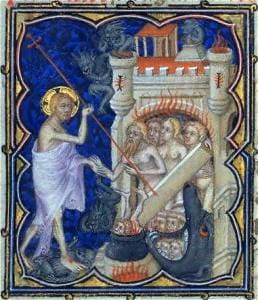Editors’ Note: We are grateful to have one of the Church’s brightest lights join us at Roman Catholic Spiritual Direction.  Ralph, in his book, The Fulfillment of All Desire has provided a treasure of inestimable worth to those who hunger to deepen their relationship with the Lord. Ralph Martin is the president of Renewal Ministries, an organization devoted to Catholic renewal and evangelization which engages in a wide variety of mission work in more than 30 countries. Renewal Ministries is the sponsor of “The Choices We Face” a widely viewed weekly Catholic television and radio program distributed throughout the world. He is also the Director of Graduate Theology Programs in Evangelization and an associate professor of theology at Sacred Heart Major Seminary in the Archdiocese of Detroit. He holds a doctorate in theology from the Angelicum University in Rome. In December of 2011, Pope Benedict XVI appointed Ralph as a Consultor to the Pontifical Council for the New Evangelization, for a five year term. He was also appointed as an expert to assist the Bishops during the 2012 Synod on the New Evangelization. He is the author of a number of articles and books the most recent of which are The Urgency of the New Evangelization: Answering the Call (2013), as well as Will Many Be Saved? What Vatican II Actually Teaches and Its Implications for the New Evangelization (2012) and The Fulfillment of All Desire: A Guidebook for the Journey to God Based on the Wisdom of the Saints (2006). He and his wife Anne reside in Ann Arbor, Michigan. Please welcome Ralph and be sure to “Share” his posts to Facebook or wherever the Lord leads. All we ask is one click a day!
Ralph, in his book, The Fulfillment of All Desire has provided a treasure of inestimable worth to those who hunger to deepen their relationship with the Lord. Ralph Martin is the president of Renewal Ministries, an organization devoted to Catholic renewal and evangelization which engages in a wide variety of mission work in more than 30 countries. Renewal Ministries is the sponsor of “The Choices We Face” a widely viewed weekly Catholic television and radio program distributed throughout the world. He is also the Director of Graduate Theology Programs in Evangelization and an associate professor of theology at Sacred Heart Major Seminary in the Archdiocese of Detroit. He holds a doctorate in theology from the Angelicum University in Rome. In December of 2011, Pope Benedict XVI appointed Ralph as a Consultor to the Pontifical Council for the New Evangelization, for a five year term. He was also appointed as an expert to assist the Bishops during the 2012 Synod on the New Evangelization. He is the author of a number of articles and books the most recent of which are The Urgency of the New Evangelization: Answering the Call (2013), as well as Will Many Be Saved? What Vatican II Actually Teaches and Its Implications for the New Evangelization (2012) and The Fulfillment of All Desire: A Guidebook for the Journey to God Based on the Wisdom of the Saints (2006). He and his wife Anne reside in Ann Arbor, Michigan. Please welcome Ralph and be sure to “Share” his posts to Facebook or wherever the Lord leads. All we ask is one click a day!
Why are We So Afraid to be Afraid of Hell?
As I’ve taught classes and given talks on the “New Evangelization,” I’ve been struck at how both Jesus and the apostles make a regular part of their message not only the positive proclamation of the Good News that Christ has, by his sacrifice, won redemption for the whole world, but also the terrible consequences of neglecting such an offer: namely, hell.
 Yet seldom is this foundational part of the New Testament’s message heard in the contemporary Church. Why are we so afraid of speaking about hell?
Yet seldom is this foundational part of the New Testament’s message heard in the contemporary Church. Why are we so afraid of speaking about hell?
Some common reactions: “Our religion is a religion of love, not of fear.” “People already have a bad self-image, and this could make them feel worse.” “Fear of hell is an unworthy motive for being a Christian.” “We shouldn’t be trying to frighten people into being good.”
While in a short article I can’t respond to reactions like these, I do want to affirm the necessity of making sure that, in our thinking, preaching and teaching, we stick with what Jesus and the apostles have told us to communicate to people. They must have good reasons.
When only the positive offer of salvation is taught and proclaimed, and we are silent about the consequences of not responding to this amazing offer of mercy, it is very easy to see the call to the New Evangelization as an “optional extra” – nice but not really necessary.
After decades of silence about the consequence of not responding to the mercy of God by a life of faith, repentance and obedience – namely, hell – an alien worldview has colonized the minds of vast numbers of our fellow Catholics that presumes that virtually everyone will be saved, except perhaps a few really notorious mass murderers.
But, of course, murder is only one of a whole number of grave sins that, if unrepented, will exclude people from the Kingdom of God: “Do you not know that the unrighteous will not inherit the Kingdom of God? Do not be deceived; neither the immoral, nor idolaters, nor adulterers, nor sexual perverts, nor thieves, nor the greedy nor drunkards, nor revilers, nor robbers will inherit the Kingdom of God” (1 Corinthians 6:9-10).
This is not an isolated text; similar lists of sins that will exclude people from heaven are contained in Galatians 5:13, 19-21; Ephesians 5:5-6; Revelation 22:14-15 – and many other places as well.
Jesus is particularly emphatic about the absolute necessity of turning away from serious sin if we are to enter the Kingdom: “And if your eye causes you to sin, pluck it out and throw it away; it is better for you to enter life with one eye than with two eyes to be thrown into the hell of fire” (Matthew 18:9).
He clearly tells us to not fear those who can kill the body, but to fear the eternal punishment due to unrepented sin in hell (Luke 12:4-5).
It isn’t just a wide range of unrepented immorality that will exclude people from the Kingdom – but perhaps the gravest sin of all: unbelief:
For God so loved the world that he gave his only begotten Son, that whoever believes in him should not perish, but have eternal life. God sent the Son into the world not to condemn the world, but that the world might be saved through him. He who believes in him is not condemned; he who does not believe is condemned already, because he has not believed in the name of the only begotten Son of God (John 3:16-18).
Father Francis Martin, in one of his biblical/theological essays, calls unbelief in the revelation of Jesus “the root sin of the world.”
“Whoever believes in the Son has eternal life; whoever disobeys the Son will not see life, but must endure God’s wrath,” John 3:36 states.
There are literally dozens of New Testament passages that speak of the eternal consequences of not repenting, of not believing, of not living a life of obedience as a disciple of Jesus.
It is manifest that Jesus and the apostles thought it important that the negative consequences of failing to respond in thought, word and deed to the message of salvation were clearly communicated to their hearers.
Jesus knew what was in the hearts of human beings and knew that the fear of hell, while not the end point of the Christian life, is a very good beginning if it motivates repentance.
And while “perfect love casts out fear” of punishment and of the Day of Judgment (1 John 4:17-18), the spiritual wisdom of the Church makes clear that we can’t jump to the end of the journey without a good beginning, patiently working through each step of purification and cleansing.
St. Catherine of Siena notes how the initial stage of the journey is characterized by a very useful fear of hell, a “slavish fear,” as she puts it, which later moves on to what she calls “mercenary love” and, finally, on to “perfect love.” You don’t jump to perfect love without a good beginning.
St. John of the Cross presupposes that before people are really ready to undertake the spiritual journey they have been deeply struck by the shortness of life, the narrowness of the road leading to life (Matthew 7:14), the strictness of the judgment, how “the just one is scarcely saved” (1 Peter 4:18), how “perdition is very easy and salvation very difficult” and the need for profound repentance from sin and wholehearted surrender to God (The Spiritual Canticle, Stanza 1;1).
St. Ignatius of Loyola, in his Spiritual Exercises, acknowledges that the most important motivation for serving God is pure love, but he also cites the useful role of “servile fear” in the spiritual journey (as also does St. Francis de Sales):
We should also strongly praise fear of his Divine majesty. For not only is filial fear something pious and very holy, but so also is servile fear. Even if it brings a person nothing better or more useful, it greatly aids him or her to rise from mortal sin, and once such a one has arisen, one easily attains to a greater filial fear (370).
If we are to have a strong Church and a dynamic evangelization, we need to pass on to everyone all that Jesus and the apostles have commanded us to pass on, including the consequences of failing to believe and obey.
We need not be so afraid of people being afraid of hell. It’s an excellent beginning to the spiritual journey – and continues to be of value even as the spiritual life progresses.
Republished with permission of the National Catholic Register.
+
Art: The Harrowing of Hell, anonymous, from a fourteenth-century manuscript, PD-US author’s life plus 100 years, Wikimedia Commons.




